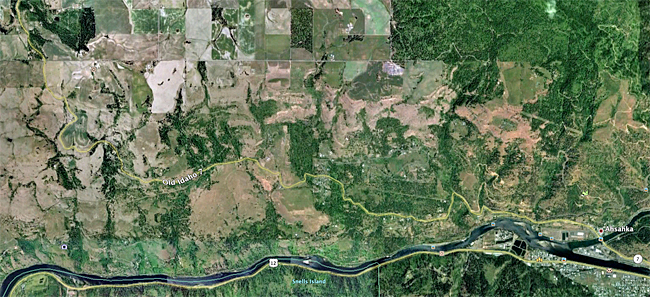

District 2 approved for innovative SEP-14 project bidding
Project engineers in District 2 are pioneering the use of innovative construction efficiencies to save costs and complete projects quicker.
The district recently received Federal Highway Administration approval of a SEP-14 (Special Experimental Project No. 14) on the Idaho 7 Gilbert Grade north of Orofino.
It is on one of the few remaining gravel roads still maintained by ITD and represents about one-third of the state highway system’s gravel miles.
Maintenance of gravel roads is much different than on a paved surface because material blows away in a cloud of dust behind each passing vehicle. The gravel does not ware out as pavements does, it simply blows away in the wind.
The project includes replacing the gravel surface on 12 miles between mileposts 36 and 49 with a crushed rock base that is a uniform thickness for a pre-determined cost of $700,000. The low-traffic route has a gravel surface and a narrow roadway width of about 20 feet that traverses steep terrain.
Another benefit of the gravel resurfacing is the use of roadway to expand the width to a standard 28 feet. In the process it also will increase safety for motorists.
The project is expected to take 40 working days and will be controlled and monitored like most other ITD contracts and include liquidated damages.
Construction is expected to begin in late 2013, with completion in the summer of 2014.
ITD’s work plan included a fixed price-best value concept under provisions of the SEP-14 that FHWA approved July 19. The intent was to use innovative contracting practices.
“Fixed price-best value bidding is a progressive bidding technique that allows a contractor to bid on a quantity of material for a price fixed by the district ($700,000 for the Idaho 7 project). The contractor that bids the most quantity wins the bid,” said Curtis Arnzen, project development engineer.
That fixed price-best value bid supports ITD’s Strategic Plan to use innovative business practices in its drive to be the best transportation department in the country. The bidding technique will help ITD control costs, keep the project within budget (key performance measures for the department) and improves travel safety.
“ITD believes that inspection costs can be reduced with fixed cost-best value bidding because tracking of pay items will be simpler,” Arnzen indicated in the SEP-14 application.
The last gravel-resurfacing project on Gilbert Grade had 11 different pay items. The quantity of each of the 11 pay items had to monitored and quantified on a bi-weekly basis to ensure prompt payment for the contractor. The method approved under SEP-14 will streamline the process to only one pay item.
“The reduction in pay items from 11 to one will result in simpler bookkeeping and efficiency. Efficiency will save taxpayer money,” Arnzen said in the SEP-14 application.
The contractor will bid a tonnage of rock that is excavated or blasted from roadway cuts, crushed, placed and compacted on the road surface. All contract items, including clearing and grubbing, wasting overburden soil, traffic control, mobilization and other items, will be incidental to the unit price of crushed gravel.
The SEP-14 process is another example of the progressive approach District 2 is taking to achieve greater efficiency and better stewardship of taxpayer funds while maintaining product quality.
Google image: Unpaved Idaho 7 is shown north of U.S. 12 and the Clearwater River near Ahsahka.
Published 7-27-2012